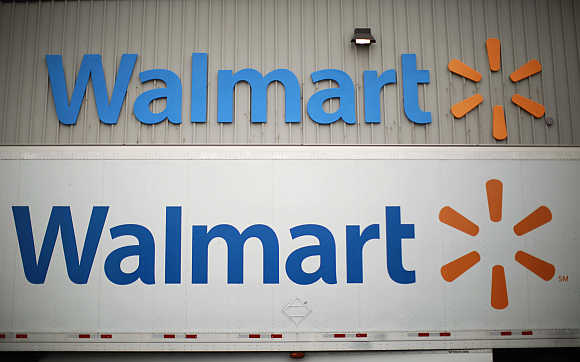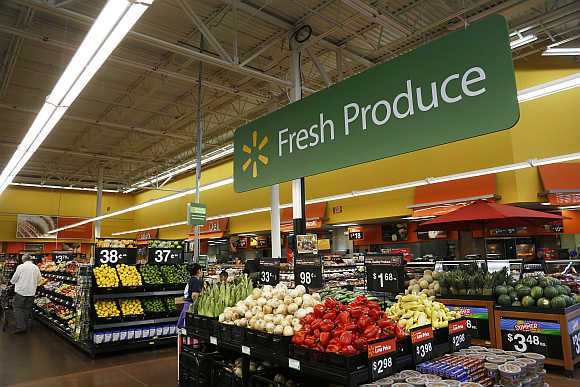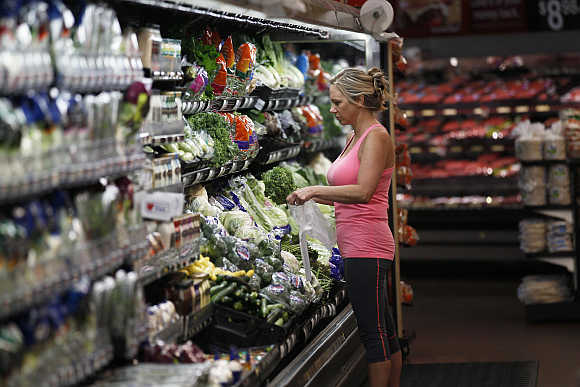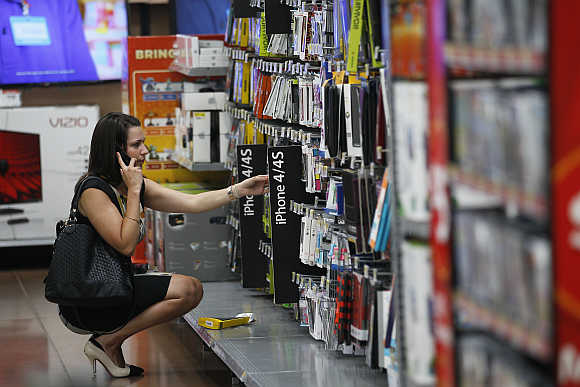Photographs: Rick Wilking/Reuters Nivedita Mookerji in New Delhi
In September last year, when Raj Jain, Walmart India president, was speaking to the media after the government had cleared 51 per cent foreign direct investment in multi-brand retail, the mood was clearly upbeat despite the lack of clarity in the policy.
Investors like the world's largest chain, Walmart, were hopeful that answers to their queries related to conditions in the multi-brand retail policy would come quickly and that they would be stepping up their business plans soon. They were wrong.
Jain had said in an interview to Business Standard almost nine months ago that there were a lot of questions on the legal structure of the existing stores, referring to the front-end retail business of the Bharti group, with whom US-based Walmart is in a 50-50 joint venture for cash-and-carry or wholesale operations.
While he had said the mandatory minimum investment of $100 million over three years was not a concern, "the issue is to understand what this $100 million means over three years".
A few days ago, the government issued a four-page clarification to the multi-brand FDI policy of September 2012, following investors' long list of concerns. But it has left many questions unanswered and has introduced some new ideas on the way that make the guidelines look even more stringent to implement.
...
Govt clarifications add to confusion over FDI in retail
Image: A Walmart Supercenter in Rogers, Arkansas.Photographs: Rick Wilking/Reuters
Among other things, the department of industrial policy and promotion listed out a thorny issue related to back-end investment as a point under "consideration" at the end of the clarification. It was yet to decide whether 50 per cent of the total investment that must go towards strengthening back-end infrastructure applied to the first tranche of funding or to every dollar spent in the country.
That, according to a top representative of a multinational consulting firm, is the make- or-break provision in the policy, and that it should have been clarified long ago.
"If the government wants chains to spend 50 per cent of every dollar invested in India on new back-end, it will be a serious roadblock - something that will make them review India plans," he says.
To a questionnaire on whether the policy clarifications may impact its retail plans in India in any way, a Bharti Walmart spokesperson says, "We are studying the government's clarification on FDI policy for multi-brand retail trading."
Other international majors such as French chain Carrefour and UK's Tesco are also studying the fine print of the clarification, more of which is expected in the coming weeks and months, it is believed.
...
Govt clarifications add to confusion over FDI in retail
Image: A Walmart Supercenter in Rogers, Arkansas.Photographs: Rick Wilking/Reuters
In fact, Tesco Chief Executive Philip Clarke had come down to meet Commerce and Industry Minister Anand Sharma recently to seek clarity on many retail issues including on whether purchase from farmers would be part of the 30 per cent sourcing requirement.
Besides confusion over back-end investment, there's more to keep investors on the back foot now. For instance, only company-owned and company-operated structure would be permitted in multi-brand retail, thereby blocking the franchise route for the industry.
In other words, if only 12 states allow retail FDI, retailers will have to restrict their spread to only those 12 states as they cannot go for any franchise agreement with a local player anywhere else. Also, the clarifications have now pointed out that not just back-end, even front-end investment must go in creating new facility.
Also, global sourcing must be distinct from the compulsory 30 per cent buying from the small-and-medium sector. Besides, states will retain the power to impose additional conditions, a provision that will keep the retailers on tenterhooks.
Another sore point is the definition of "group companies" in the context of restricting wholesale companies from selling their products to retailers from the same stable.
...
Govt clarifications add to confusion over FDI in retail
Image: A Walmart Supercenter in Rogers, Arkansas.Photographs: Rick Wilking/Reuters
Though the government has indicated the step is being reviewed, if the condition is not changed, a company such as Bharti Walmart will not be able to sell more than 25 per cent of its products to EasyDay, the retail chain that is owned by Bharti Retail of the Bharti group.
This is because Bharti Retail is a group company in relation to the Bharti-Walmart cash-and-carry business. To be able to sell its products without restrictions to EasyDay, the companies will require to rejig their equity structure. An industry source says nothing is expected to move till the 2014 general elections as far as multi-brand retail is concerned.
And with the clarifications that have come, no merger or acquisition is likely. That's bad news for both foreign investors like Walmart, Tesco and Carrefour as well as domestic retail chains like Future Group and Spencer's. However, some say since Walmart has already waited more than five years, since 2007, it can afford to wait another two years.
The fresh investment of $100 million may push the company's breakeven by perhaps a year or so, but nothing more, he points out. Also, it's possible that international chains which operate cash-and-carry business and have retail plans, may convert some of their yet-to-open wholesale outlets into retail stores, thereby counting that as part of greenfield or fresh investment.
...
Govt clarifications add to confusion over FDI in retail
Image: A Walmart Supercenter in Rogers, Arkansas.Photographs: Rick Wilking/Reuters
Both Walmart and Carrefour could consider doing that, the source adds. Incidentally, Bharti Walmart hasn't opened a single cash-and-carry store in 2013 to add to its tally of 20. Carrefour has four stores, and it may open one in Bangalore later this year.
Bharti Walmart also has things tied up for another three to four cash-and-carry stores by year end, but a lot will depend on its interpretation of the retail policy. The companies that will be hit hard if foreign investors review their India plans or take time in coming are the ones like Future Group, Bharti and Spencer's, according to an industry expert who does not want to be named.
Kishore Biyani, founder and chief executive, Future Group, had told Business Standard last week that the government's clarifications do not help anybody, clarifying, however, that his company was not expecting any foreign investment. Govind Shrikhande, managing director, Shoppers Stop, admits that it would be tough to get foreign capital for domestic players after the latest clarifications.
As for Walmart, realistically speaking, irrespective of the policy hurdles, it is unlikely to move forward on its retail venture till the time the enforcement directorate investigates its $100 million investments of 2010 in the form of compulsory convertible debentures into Cedar Support, the holding firm of Bharti Retail, allegedly in violation of the Foreign Exchange Management Act.
...
Govt clarifications add to confusion over FDI in retail
Image: A Walmart Supercenter in Rogers, Arkansas.Photographs: Rick Wilking/Reuters
Walmart can convert the CCDs into 49 per cent equity in the company by September. Apart from the ED probe, Walmart is yet to conclude its internal investigations into compliance of the US Foreign Corrupt Practices Act that prohibits American companies from bribing government officials in other countries.
Some months ago, the company suspended five executives at Bharti Walmart till the time this investigation was on. Also, the Mudgal Committee report on Walmart lobbying to gain wider access to markets, including India, is expected to be tabled in Parliament during the forthcoming Monsoon session, another reason why the American chain would like to wait and watch even if it has maintained lobbying was done in the US and the disclosure about it was made in the Senate according to the law.
But, even as Walmart has not been able to keep to the India timeline, the company knows "investing in India is like a marathon", to quote Jain.
...
Govt clarifications add to confusion over FDI in retail
Image: A Walmart Supercenter in Rogers, Arkansas.Photographs: Rick Wilking/Reuters
Fresh hurdles
i) Government yet to decide whether 50 per cent to be invested in back-end infrastructure is to be calculated for the first tranche of $100 million or for every dollar coming into India
ii) Only company-owned and company-operated structure permitted in multi-brand retail
iii) Entire $100 million mandatory investment must be for new facility. So, not just back-end, even front-end must be new
iv) Global sourcing must be distinct from the compulsory 30 per cent buying from small and medium sector
v) No final take yet on whether a cash -and- carry company's sales to a group retail company must be restricted to 25 per cent of total sales
vi) States will have the power to impose additional conditions









article